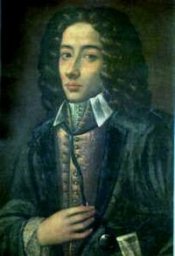
01 Dec 2005
PERGOLESI: La serva padrona
La serva padrona, intermezzo in two parts
Music composed by Giovanni Battista Pergolesi. Libretto by Gennar'antonio Frederico.
First performance: 28 August 1733, Teatro San Bartolomeo, Naples.
Mozart and Salieri, an opera in one act consisting of two scenes.
Nicolai Rimsky-Korsakov (1844-1908), composer. Libretto derived from Alexander Puskhin's play of the same name.
First performance: 7 December 1898 in Moscow.
Ariadne auf Naxos, Oper with a prologue and one act. Music composed by Richard Strauss. Libretto by Hugo von Hofmannsthal.
La Vestale, a tragédie lyrique in three acts.
Boris Godunov, an opera in four acts with prologue
Modest Mussorgsky, composer. Libretto by the composer, based on Alexander Pushkin's drama Boris Godunov and Nikolai Karamazin's History of the Russian Empire
First performance: 8 February 1874 at the Mariinsky Theatre, St. Petersburg
Il Trovatore, dramma in four parts.
Only a few months following the premiere of Der Rosenkavalier, Hugo von Hofmannsthal proposed a new opera to Richard Strauss based on Molière’s comedy-ballet, Le Bourgeois gentilhomme (in German, Der Bürger als Edelmann).
Die Entführung aus dem Serail, Singspiel in 3 Acts.
Music composed by Wolfgang Amadeus Mozart (1756–1791). Libretto by Johann Gottlieb Stephanie the Younger, based on an earlier libretto by
Christoph Friedrich Bretzner.
Die Entführung aus dem Serail, Singspiel in 3 Acts.
Music composed by Wolfgang Amadeus Mozart (1756–1791). Libretto by Johann Gottlieb Stephanie the Younger, based on an earlier libretto by
Christoph Friedrich Bretzner.
Arabella: Lyrische Komödie in three acts
Die Entführung aus dem Serail, Singspiel in 3 Acts.
Music composed by Wolfgang Amadeus Mozart (1756–1791). Libretto by Johann Gottlieb Stephanie the Younger, based on an earlier libretto by
Christoph Friedrich Bretzner.
La Gioconda, dramma lirico in four acts.
Music composed by Amilcare Ponchielli (1834–1886). Libretto by Arrigo Boito (under the pseudonym Tobia Gorrio), based upon Victor Hugo's Angelo, Tyrant of Padua (1835).
Don Carlo, an opera in four acts. Music composed by Giuseppe Verdi (1813–1901). Libretto by Joseph Méry and Camille Du Locle after Friedrich von Schiller’s dramatic poem Don Carlos, Infant von Spanien. Revised version in four acts (French text revised by Du Locle, Italian translation by Achille de Lauzières and Angelo Zanardini).
Un ballo in maschera, a melodramma in three acts.
Music composed by Giuseppe Verdi. Libretto by Antonio Somma, based upon the work of Eugène Scribe Gustave III ou Le bal masqué (1833)
Medea: Melodramma tragico in three acts.
Die Tote Stadt, an opera in three acts.
Music composed by Erich Wolfgang Korngold (1897-1957). Libretto by Paul Schott (Julius and E. W. Korngold) after the novel Bruges la morte by Georges Rodenbach.
Some Details concerning the Revolution inaugurated by Rossini
Manon Lescaut, dramma lirico in quattro atti
Elektra: Tragedy in one act.
Lyric Opera of Chicago has announced both schedules and cast-lists for is Spring 2020 performances of Richard Wagner’s Ring Cycle. Given the series of individual productions already staged by the company since Fall 2016, that pave the way for the complete cycle, Lyric Opera of Chicago’s complete production should affirm the artistic might of the great composer.
“Diacono himself does not know what musical talent he possesses” – Mascagni

La serva padrona, intermezzo in two parts
Music composed by Giovanni Battista Pergolesi. Libretto by Gennar'antonio Frederico.
First performance: 28 August 1733, Teatro San Bartolomeo, Naples.
Streaming Audio
Characters:
| Serpina, a maidservant | Soprano |
| Uberto, her master | Bass |
| Vespone, a servant of Uberto | Non-singing role |
Synopsis:
Intermezzo I
Dressing room.
Uberto, an elderly bachelor, is angry and impatient with his maidservant, Serpina, because she has not brought him his chocolate today. Serpina has become so arrogant that she thinks she is the mistress of the household. Indeed, when Uberto calls for his hat, wig and coat, Serpina forbids him from leaving the house, adding that from then on he will have to obey her orders. Uberto thereupon orders Vespone to find him a woman to marry so that he can rid himself of Serpina.
Intermezzo II
Same dressing room.
Serpina convinces Vespone to trick Uberto into marrying her. She informs Uberto that she is to marry a military man named Tempesta. She will be leaving his home and apologizes for her behavior. Vespone, disguised as Tempesta, arrives and, without saying a word, demands 4,000 crowns for a dowry. Uberto refuses to pay such a sum. Tempesta threatens him to either pay the dowry or marry the girl himself. Uberto agrees to marry Serpina. Serpina and Vespone reveal their trick; but Uberto realizes that he has loved the girl all along. They will marry after all; and Serpina will now be the true mistress of the household.